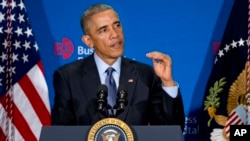U.S. President Barack Obama has offered his views about the United States' relations with China and Russia, voicing optimism about U.S. links with Beijing but pessimism about increasingly antagonistic exchanges with Moscow.
Obama made his comments Wednesday in an expansive question-and-answer session in Washington with the Business Roundtable group, whose members include chief executives of the biggest U.S. companies.
Obama praised Chinese President Xi Jinping, saying he might have assumed more control of his country than any Chinese leader since Deng Xiaoping, who led China from 1978 to 1992.
"He has consolidated power faster and more comprehensively than probably anybody since Deng Xiaoping. Everybody's been impressed by his clout inside of China after only a year-and-a-half or two years," said Obama.
Nonetheless, Obama said Xi's control raises "dangers in that on issues of human rights, on the issue of clamping down on dissent" and said that he "taps into a nationalism that worries his neighbors," including maritime disputes in the South China Sea.
Obama, however, said he sees China's "very strong interest in maintaining good relations with the United States," even as the U.S. presses Beijing to curb cyber security abuses targeting U.S. businesses and government agencies.
“Less optimistic” on Russia
Obama said he is "less optimistic" about the country's relations with Russia and especially President Vladimir Putin. The American leader said he has "a very direct, blunt and business-like relationship with Putin."
He criticized Putin's intervention in Ukraine and the threat it poses to other countries bordering Russia.
"[Putin] has been improvising himself into a nationalist, backward-looking approach to Russian politics that is scaring the heck out of his neighbors and is badly damaging his economy, and sanctions are having a big bite on their economy," he said.
Obama said Putin's Ukraine stance "is working for him [Putin] politically inside of Russia even though it is isolating Russia completely internationally."
The U.S. president said he does not see Putin withdrawing from involvement in Ukraine anytime soon. He said he did not think "that will happen until the politics inside of Russia catch up to what's happening in the economy inside of Russia." Short of a change in Putin's view, Obama vowed that the U.S. would continue to impose economic sanctions against Moscow.
In September, President Obama and European leaders targeted Russia's biggest financial institution, Sberbank, with penalties, and blocked Russian energy companies from access to Western technologies used in deepwater shale oil extraction.
In his comments Wednesday, Obama described those sanctions and others as taking "a big bite" out of the Russian economy.
Those sanctions, coupled with a sharp decline in oil exports and the freefall of the Russian ruble, prompted Moscow on Tuesday to predict the Russian economy will further contract in 2015. European analysts in September forecast a 0.2 percent downturn, after earlier predicting a 0.6 percent expansion for the same period. Moscow confirmed those figures Tuesday.
Analysts also say the value of the ruble, which has dropped by more than 40 percent this year, could push inflation to 9 percent in the coming weeks.
President Putin is set to deliver his annual address to the nation on Thursday.
On home front
On the U.S. front, Obama promised to make new efforts in the next two years to work with the Republican-controlled Congress to reform the country's complex tax code, including lowering some of the highest corporate tax rates in the world; but, he said changes must include provisions that benefit working class families, not just wealthy taxpayers and corporations.
He said the U.S. economy, the world's largest, is continuing to advance, but that "wages and income still haven't gone up significantly" for most U.S. workers, even as the unemployment rate has fallen below 6 percent and corporate profits have soared.
Despite the improving American economy, Obama said it "could be pulled back by global weakness." He voiced particular concern about Europe's 18-nation euro currency bloc, which is near a recession, and Japan, where the economy is already contracting.





